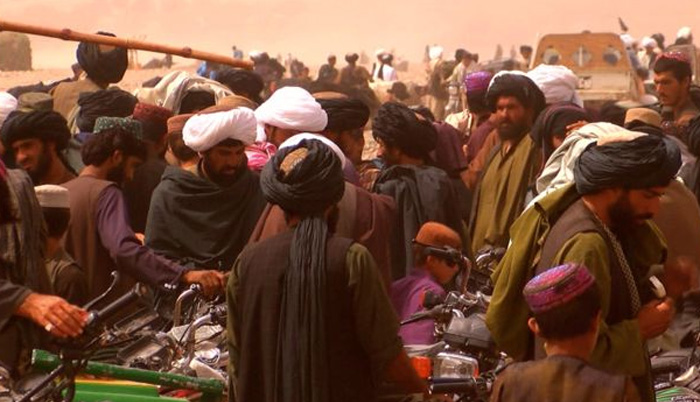![]() Home > Asia
Home > Asia
Taliban Territory: Life In Afghanistan Under The Militants

Men at the market in Musa Qala - women are rarely seen in public
![]() June 9th, 2017 | 08:38 AM |
June 9th, 2017 | 08:38 AM | ![]() 2499 views
2499 views
AFGHANISTAN
Sixteen years after they were ousted in the US-led invasion, the Taliban have fought their way back to control swathes of Afghanistan. The country remains mired in conflict, and recent months have seen a series of bloody attacks. In the south, key towns are now Taliban territory. The BBC's Auliya Atrafi was invited by the militants to spend four days behind the front line in Helmand province witnessing life under their control.
In the town of Sangin, two dozen men sat cross-legged inside a huge mud compound. Under the full moon, their black turbans cast deep shadows over their sunburned features.
These were the Taliban's special forces; the Red Unit. They sat quietly as they listened to their commander Mullah Taqi telling war stories, gently cradling their M4 machine guns. The M4s, with their night-vision scopes, were one of the main reasons they had captured nearly 85% of Helmand province from less-well-armed Afghan forces.
But these victories had presented Taliban leaders with an unexpected challenge.
The people they now ruled had lived with government services for more than a decade. Schools, hospitals, development - residents had become accustomed to them. So how could a group entirely focused on taking territory evolve into one that could attempt to run it?
Setting up our visit to Taliban territory took months. It had been years since a journalist with international media had secured such access. But in mid-May, we crossed the frontline in Gereshk, following a boy on a motorbike. We drove on the main Kabul-Herat highway towards Kandahar.
Just by an Afghan National Army post, the boy suddenly turned left, leaving the highway behind, and rode into scattered settlements. He handed us over to two Taliban guards who were manning a makeshift base. One sat with us in the car, while the other led us on a motorbike towards the Zanbulai area.
There, waiting for us. was Mullah Taqi, the head of Taliban special forces. He stood with a group of his men, all nursing sophisticated weaponry.
Throughout the visit we were accompanied by a Taliban media team who controlled what we saw.
We were not allowed to film anything to do with opium. The opium trade is synonymous with this region - Afghanistan produces about 90% of the world's opium - and helps fund the Taliban.
I tried to explain to their media head, Asad Afghan, the English concept of "an elephant in the room". He put his hand on my shoulder and said: "Opium is our economic necessity, but we hate it as much as you do."
The fact is the Taliban need the money they get from drugs - it buys arms and helps fund their fight.
Our first encounter with Taliban governance came in the market. Sangin has been fiercely contested for more than a decade - hundreds of UK, US and Afghan troops lost their lives here - and finally fell to the Taliban in March this year.
The old Sangin bazaar had been flattened in the battle for the city. We walked through its makeshift replacement, a sea of tarpaulin and boxes. Two men were arguing by a food stall.
"I can't read!" shouted shopkeeper Haji Saifullah. "How was I supposed to know the biscuits were out of date?" He fidgeted with his turban, pushing it to one side nervously.
The other man was the Taliban mayor of Sangin, Noor Mohammad. He ordered Haji Saifullah to be imprisoned for three days and to pay a fine.
Next on the mayor's list was inspecting petrol containers to see if they had been altered to pour under the promised gallon. After that came examinations for people who claimed to be doctors, but who he suspected were lying.
Later we drove to Musa Qala, the Taliban's de facto capital. Just short of the town, we stopped at a travelling bazaar set up on a dry riverbed.
Musa Qala is famous for the opium trade but it is also a commercial lifeline for the district. Traders come here all the way from the Afghan-Pakistan border areas.
At the bazaar you could buy motorbikes, cows, ice-cream - and less conventional commodities such as ammunition.
Bullets for an AK47 were 25 cents (15p) each. Bullets for a Russian machine-gun used to be 40 cents each, but were reduced to 15 cents because - according to the shopkeeper - too many of them had been captured from the Afghan security forces.
While the Taliban focus on health, safety and trading standards in Sangin was surprising, more discoveries awaited us in Musa Qala. Despite it being the Taliban capital, the school and hospital were still being funded by the government in Kabul.
Source:
courtesy of BBC NEWS
by BBC NEWS
If you have any stories or news that you would like to share with the global online community, please feel free to share it with us by contacting us directly at [email protected]